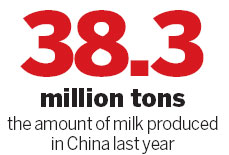Dairy sector facing the 'biggest opportunity ever'
DeLaval, the global producer of dairy and farming machinery, is predicting demand for dairy products will triple in China over the next 15 to 20 years.
Markku Vauhkonen, the company's regional president in East Asia, said China's rapid urbanization and increasing disposable income have prompted a huge rise in the consumption of dairy products, and the country's dairy industry is facing "the biggest opportunity ever".
However Vauhkonen also warned it is facing potential problems, which have to be overcome if that potential is to be realized.
He said the fast-growing dairy sector in China has yet to find a way to increase productivity.
The 125-year old DeLaval, which is part of the huge Tetra Laval Group with global sales of 12.6 billion euros ($16 billion) in 2011, describes itself as one of the world's leading suppliers of solutions that improve the performance of farms for professional food producers.
"China could not follow the industry model in the United States, because it does not have enough land and Chinese farmers do not have access to as much capital as US farmers," said Vauhkonen.
"In the meantime, the European model centers on a scale that is too small for China.
"China needs to find its own model," he added.

But DeLaval is far from the first multinational from the global industry to suggest China is facing considerable challenges ahead, in meeting its growing thirst and hunger for dairy products.
Robert Erhard, the fresh milk procurement and agricultural service manager, greater China region at Nestle, noted the same kind of agricultural modernization has taken place in many other countries, but "the speed of the transition to be achieved" could be a problem for China, because it has only limited time compared with other success stories.
China is the world's third-largest milk producer. Last year milk output reached 38.3 million metric tons, industry data showed.
International players eying a slice of that market said they are facing three key issues in their quest to guarantee quality supplies: shortages of raw materials, particularly feed for cattle; long supply chains between farms and retail shelves; and growing concerns over food safety.
On the latter, the industry suffered a major setback in 2008, after a decade of strong growth, when six Chinese infants died and thousands became ill after drinking domestically produced milk products that contained the industrial chemical melamine.
The scandal severely damaged consumer confidence and had a serious impact on the industry's momentum.
Productivity, having grown steadily at an average 17.4 percent year-on-year in the decade before 2008, crumbled to 1.29 percent afterwards, industry data showed.
An ensuing drop in milk prices, with a rise in production costs, compounded the market slowdown, prompting farmers to sell and slaughter cows, which reduced the country's cattle population and its milk productivity.
Consumers, especially those in cities, turned to imported milk powder and other products, with imports shooting up to more than 800,000 tons in recent years, compared with 140,000 tons in 2008.
"China cannot satisfy its demand with imports," added Erhard.
"It has to produce the milk by itself."
Meanwhile, Chinese companies said they are making every effort to regain customer trust by imposing tighter quality and safety controls.
"We have upgraded our inspection facilities and implemented stricter quality control in our supply chain, transportation and all other production processes," said Wang Yansong, the assistant president of Chinese dairy giant Mengniu Dairy Co Ltd.
Analysts suggest China's dairy industry has now entered a crucial stage, when customers must be assured of quality, first and foremost, after fears were once again triggered last week by media reports that industrial chemical had been found in dairy products, this time imported from New Zealand.
(China Daily 01/29/2013 page15)














